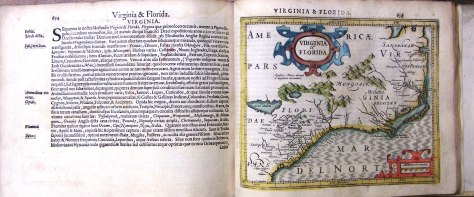Durham Cathedral has acquired an internationally renowned collection of manuscripts and historic artefacts over the centuries. Each month we feature one of these objects as ‘Treasure of the Month’.
Some items from the Cathedral’s collections are on display in Open Treasure, a new world-class visitor experience at the heart of the Cathedral’s medieval monastic buildings.

Durham Cathedral’s Refectory Library contains around 30,000 titles, in 11,000 volumes, printed between 1501 and the mid-19th century. As well as Bibles and works of theology, the collection also comprises works on a vast range of subjects including natural history, law, medicine, mathematics, astronomy, science and local studies. It also contains a significant and highly popular collection of early maps and atlases.
Treasure of the Month for April is one of those atlases – Gerard Mercator’s 1607 Atlas Minor. Pocket-sized maps such as those included in this volume were becoming increasingly popular in the early 17th century, as they were more affordable and accessible to a public eager for more information about the world around them; Mercator’s Atlas Minor had the benefit of being slightly larger and therefore more detailed than some of the pocket maps of his competitors, and his work proved exceptionally popular. This volume has been beautifully hand-coloured.
In his lifetime, Mercator was considered the world’s most famous geographer, and one of the founders of the Netherlandish school of cartography. However, he also identified himself as a calligrapher, an engraver, a publisher, and a maker of scientific instruments. The first to use the word “atlas” to refer to a collection of maps in a volume, Mercator is said to have named it after King Atlas of Mauretania, the son of the Titan Atlas and the world’s first geographer. However, after Mercator’s death, as his plates started to be used by other mapmakers, Atlas became the legendary rebel forced to atone for his sins by bearing the weight of the heavens on his shoulders.
Unlike many cartographers and geographers of his era, Mercator personally travelled little; most of his knowledge came from his collection of over a thousand maps and books, as well as correspondence with learned figures from across the world. His family – clearly in some financial difficulty – sold off his library in 1604, following Mercator’s death, at a public auction in the Netherlands.

Although his world map of 1569, drawn on the projection that bears his name, is generally accepted to be his greatest accomplishment, Mercator devoted twenty five years of his life to his Atlas, and had not completed it when he died. After initially disappointing sales, his grandsons sold the plates to Flemish engraver and cartographer Jodocus Hondius in 1604. Hondius included an additional 40 maps and issued the atlas as a new edition, featuring both himself and Mercator on the title page (although the two men had never met in life). Under Hondius’s influence, the atlas became a great success, with 29 editions produced between the years of 1609 and 1641, by Hondius, his son Henricus, and son-in-law Jan Jansson – all established and famous cartographers in their own right.
Nowadays, the Mercator projection – rather than his maps and atlases – is considered to be Mercator’s greatest and most significant legacy; it revolutionised the art of navigation, making it safer, simpler and more straightforward for mariners to navigate a path through the oceans, and by the end of the 17th century, chart makers across the world were using Mercator’s projection to detail oceans and coastlines. In Durham Cathedral Library, however, as in a number of other special collections libraries worldwide, Mercator’s Atlas Minor continues to exist as a point of beauty and interest for cartophiles everywhere.
Find out more about our wonderful expanse of Collections here.

